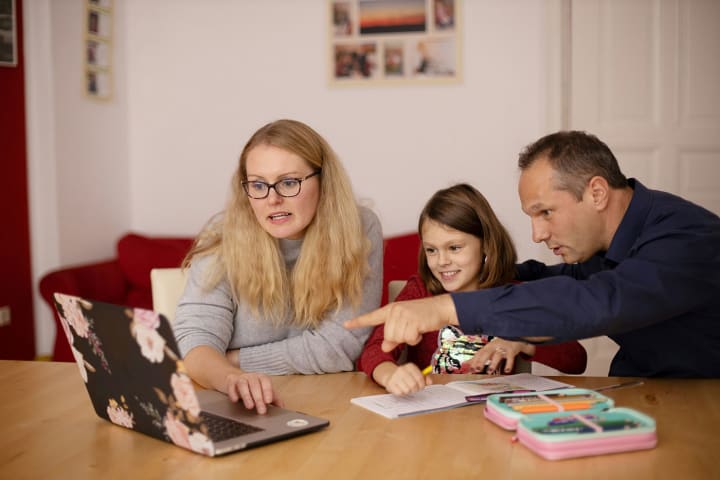Navigating The Digital Age With Mindfulness
Managing Screen Time For Children

In today's fast-paced world, the digital landscape has become an integral part of our daily lives, offering unparalleled convenience and connectivity. From social media scrolling to binge-watching our favorite shows, screens dominate our attention, shaping how we interact with the world around us. However, amidst the myriad benefits, a growing concern looms over the potential pitfalls of excessive screen time. While much has been said about the negative effects on the younger generation, it's time to shift the narrative. This article explores a different angle, focusing on the importance of finding balance and cultivating mindfulness in the digital age. It's not about demonising screens but rather about harnessing their power mindfully to lead healthier, more fulfilling lives.
How Much Screen Time is Okay for Children?
In the digital age, determining the appropriate amount of screen time for children has become a topic of considerable debate and concern. According to guidelines provided by the UK government's Department of Health and Social Care, children aged 5 to 18 should aim for a maximum of two hours of recreational screen time per day. This recommendation stems from a recognition of the potential negative impacts of excessive screen exposure on children's physical health, mental well-being, and cognitive development. It's essential for parents and caregivers to strike a balance, ensuring that screen time is not detrimental to other activities crucial for children's growth and development, such as physical exercise, social interaction, and creative play. By setting clear boundaries and fostering open communication about screen use, families can empower children to navigate the digital world responsibly while prioritizing their overall well-being.
How Can Parents Manage Screen Time For Children?
Managing screen time for children can be a challenging task, but with the right approach, parents can help their children develop healthy habits and use screens responsibly. Here are some strategies for effective screen time management:
1. Set Clear Boundaries: Establish clear rules and guidelines regarding screen time, including when and where screens can be used, and for how long. Consistency is key to enforcing these boundaries.
2. Lead by Example: Children often mimic their parents' behavior, so demonstrate healthy screen habits by limiting your own screen time and engaging in alternative activities.
3. Encourage Variety: Encourage children to engage in a diverse range of activities beyond screens, such as outdoor play, reading, hobbies, and spending time with family and friends.
4. Create Screen-Free Zones: Designate certain areas of the home, such as bedrooms and mealtime areas, as screen-free zones to promote family interaction and uninterrupted rest.
5. Use Screen Time Wisely: When screens are allowed, prioritize educational and age-appropriate content. Utilize parental controls and monitoring tools to ensure children's safety online.
6. Foster Communication: Keep the lines of communication open with your children about their screen use. Discuss the importance of balance and help them understand the potential effects of excessive screen time on their health and well-being.
7. Be Flexible: While it's essential to maintain consistency, be open to adjusting screen time limits based on individual circumstances, such as special occasions or academic needs.
By implementing these strategies and fostering a supportive environment, parents can effectively manage screen time for their children and promote a healthy balance between technology use and other activities.

The Negative Effects Of Too Much Screen Time
Excessive screen time among children has been associated with various negative effects, including a concerning rise in myopia and other eye conditions. Prolonged exposure to screens, characterised by continuous near-distance focusing and reduced blink rates, can strain the eyes and contribute to the development or exacerbation of myopia, commonly known as nearsightedness. Moreover, the blue light emitted by screens has been linked to digital eye strain, which encompasses symptoms such as dry eyes, headaches, and blurred vision. With the prevalence of digital devices in daily life, children are spending more time engaged with screens from a young age, raising concerns about the long-term impact on their visual health. As such, it is crucial for parents and caregivers to monitor and regulate their children's screen time to mitigate the risk of eye-related issues and promote overall ocular health.
A Solution To A Growing Problem
In addressing the growing problem of excessive screen time and its associated negative effects on eye health, advancements in technology offer promising solutions. While laser eye surgery presents an option for correcting refractive errors like myopia, it's essential to prioritize preventive measures and holistic approaches to screen time management. Technological advancements in screen devices themselves, such as the development of blue light filters and adjustable screen settings, can help reduce eye strain and mitigate the impact of prolonged screen exposure.

Additionally, innovative wearable devices, like smart glasses, equipped with features such as reminders for screen breaks and posture correction, provide proactive measures to promote healthy screen habits. Emphasizing a multi-faceted approach that combines technological innovations with education, lifestyle modifications, and regular eye care, holds the potential to address the root causes of excessive screen time and safeguard the ocular health of children and adults alike.
About the Creator
D. J. Irvine
With a passion for exploring the intricacies of existence through words, Irvine is a multi-faceted writer known for his versatility across various industries.






Comments
There are no comments for this story
Be the first to respond and start the conversation.